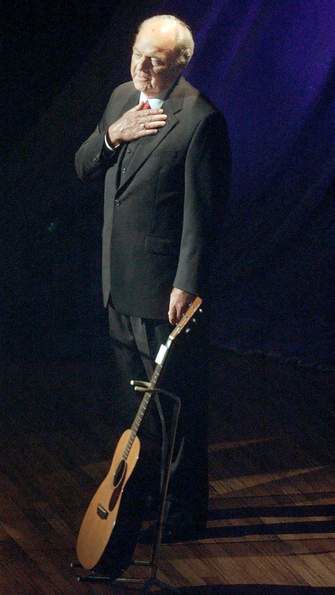Marshall Grant, bassist for Johnny Cash, dies
Published 5:00 am Wednesday, August 10, 2011

- Marshall Grant, bassist for Johnny Cash & The Tennessee Two, stands next to one of Cash's guitars during a 2003 memorial for Cash in Nashville, Tenn. Grant, the last surviving member of the group, died Sunday at age 83, in Jonesboro, Ark.
Marshall Grant, a bass player who, as an original member of Johnny Cash’s band, the Tennessee Two, helped create the group’s pulsing “boom-chicka-boom” sound, died Sunday in Jonesboro, Ark. He was 83.
His death was confirmed by the Memorial Park Funeral Home and Cemetery in Memphis, Tenn. Grant, who lived in Hernando, Miss., was in Jonesboro for the Johnny Cash Festival, an event to raise money to restore Cash’s childhood home in Dyess, Ark.
Grant, who played acoustic and electric bass with Cash from 1954 to 1980 and was the road manager for the group, provided the thumping foundation on “Folsom Prison Blues,” “I Walk the Line,” “Ring of Fire,” “The Man in Black” and many other songs and on the live albums that Cash recorded at Folsom prison and San Quentin.
Luther Perkins, the other original member of the Tennessee Two, played lead guitar and created the scratchy rhythm pattern overlaying Grant’s bass lines. With the addition of the drummer W.S. Holland in 1960, Cash’s backup became the Tennessee Three.
The group’s signature sound came into being overnight — literally — as Grant recounted on a number of occasions. Shortly after he switched from rhythm guitar to bass, which he did not know how to play, he and his fellow musicians began experimenting with the group’s new configuration.
“We finally got it tuned, and then we stuck adhesive tape all over the neck with the notes on it, and then we started playing little rhythm patterns,” he said on being inducted into the Musicians’ Hall of Fame and Museum in Nashville, Tenn., with Perkins in 2007. “The only thing that we could do was what the world now knows as the boom-chicka-boom-chicka-boom sound that we established that first night.”
Grant was introduced to Cash in 1947, and recorded and toured with him for the next 25 years. A teetotaler and nonsmoker, he took on the arduous task of shepherding Cash to performances through the years of his well-documented drug abuse and erratic, self-destructive behavior. “I took every step that he took, I looked out after him,” he said in a 2008 interview with the website classicbands.com. “I did everything you could do for a person.”
The relationship came to grief in 1980. After a series of disputes, Cash fired Grant, who sued for wrongful termination and embezzlement of retirement money. The suit was settled out of court.
“Marshall was a solid, solid rock,” Roseanne Cash told The Nashville Tennessean. “I cannot imagine what would have happened on those tours without him. He understood how complicated my dad was, that he was a great musician who had real demons.”
After parting ways with Cash, who died in 2003, Grant managed the Statler Brothers, with whom he had recorded the 1965 hit “Flowers on the Wall.” He later reconciled with Cash and performed with him onstage in 1999.
In addition to his wife, Etta, survivors include a son, Randall.






